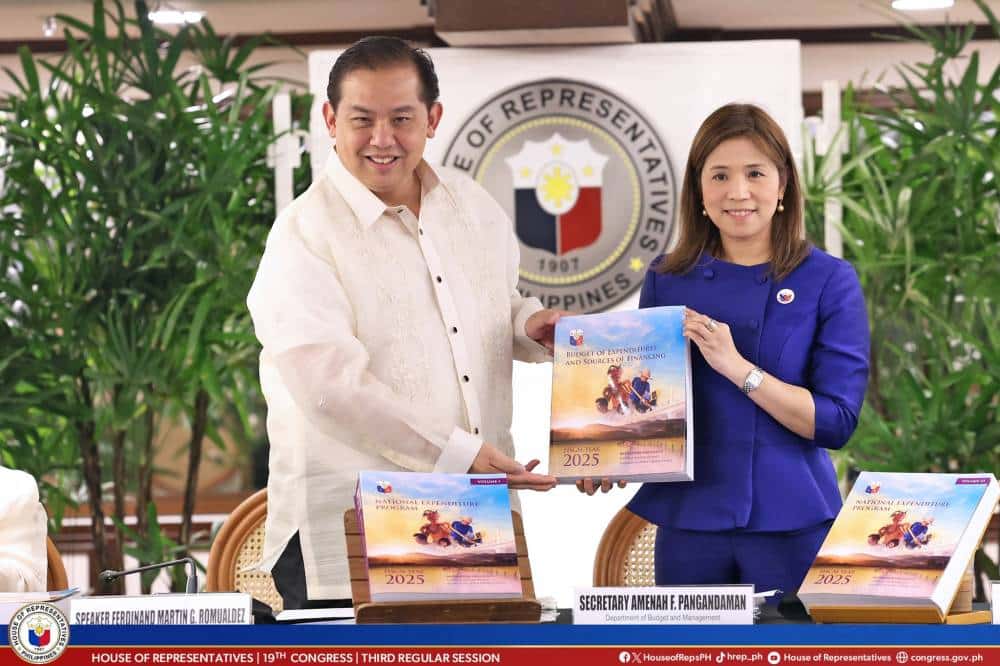
The House of Representatives under the leadership of Speaker Ferdinand Martin Romualdez received from Budget Secretary Amenah Pangandaman the proposed P6.352-trillion National Expenditure Program (NEP) for Fiscal Year 2025 last July 29, 2024. PHOTO FROM HOUSE OF REPRESENTATIVES
MANILA, Philippines — Hearing the budgetary policies and expectations of the Development Budget Coordination Committee (DBCC) will help in crafting a “realistic budget” for 2025, Ako Bicol party-list Rep. Elizaldy Co said on Monday.
At the start of the House Committee on Appropriations hearing on the P6.352-trillion National Expenditures Program (NEP) for 2025, Co said the DBCC would provide reasons as to why the executive branch is proposing such budget, and how programs can be funded despite limited resources.
The DBCC is composed of the Department of Budget and Management (DBM), the Department of Finance (DOF), the National Economic and Development Authority (Neda), the Office of the President (OP), and the Bangko Sentral ng Pilipinas (BSP). Usually, budget deliberations at the House committee level starts with the DBCC’s presentation.
“The [DBCC] plays a pivotal role in crafting this budget. The DBCC’s expertise and insights are instrumental in the decisions we will make to shape a realistic budget. As we discuss details of the proposed allocations, we must recognize the thorough analysis and careful planning undertaken for each line item,” said Co, who chairs the panel.
“DBCC members from BSP, NEDA, DOF, and DBM will outline the scope of fiscal planning undertaken on the proposed budget. They will also present the budget’s key components, including revenue projections, financing strategies, and expenditure priorities,” he added.
According to Co, the committee’s goal is to approve a budget that supports both the urgent needs of people and the government’s long-term vision.
“The proposed national budget is more than just a financial document; it reflects our priorities, commitments, and vision for the future. It outlines the government’s plan to stimulate economic growth, enhance social services, improve infrastructure, and ensure sustainable development. In these challenging times, a well-crafted budget is essential for addressing our country’s pressing issues, from economic recovery to social equity and food security,” he added.
House Speaker Ferdinand Martin Romualdez also noted that crafting the national budget is a “critical tool for steering a country’s development path.”
Romualdez and Co were both present when the panel started hearing the presentation of the DBCC.
READ: House begins committee hearings on proposed 2025 national budget
“On top of the priority list is education with an allocation of P977.6 billion; public works with P900 billion; health with P297.6 billion; interior and local government with P278.4 billion; defense with P256.1 billion; social welfare with P230.1 billion; agriculture with P211.3 billion; transportation with P180.9 billion; the Judiciary with P63.6 billion, and justice with P40.6 billion,” Romualdez said.
“In the coming weeks, we shall engage in scrutinizing, clarifying, and deliberating on the smallest details of the proposed 2025 national budget. As we fulfill this fundamental constitutional task, we must recognize the importance of promoting human and social development,” he added.
The Philippine Amusement and Gaming Corporation and the Philippine Charity Sweepstakes Office’s contribution to the budget will be discussed on Tuesday, April 6.
As of Monday, here are the agencies scheduled to appear before the House Committee on Appropriations:
- August 7 (Department of Environment and Natural Resources/ Department of Human Settlements and Urban Development)
- August 8 (Department of Energy/ Energy Regulatory Commission/ Commission on Higher Education)
- August 12 (Department of Agriculture)
- August 13 (Department of Foreign Affairs/ Commission on Audit)
- August 14 (Department of Trade & Industry)
- August 15 (Department of Agrarian Reform/ Office of the Vice/ Department of the Interior and Local Government)
- August 20 (Department of Migrant Workers/ Department of Tourism)
- August 22 (Department of Labor and Employment/ Department of Information and Communications Technology/ Department of Social Welfare and Development)
- August 27 (Civil Service Commission/ Office of the Ombudsman)
- August 28 (Department of Transportation)
- August 29 (Commission on Elections/ Commission on Human Rights/ Department of Science and Technology)
- September 2 (Department of Education)
- September 3 (Office of the President/ Presidential Communications Office)
- September 4 (Department of Health)
- September 5 (The Judiciary/ Department of Justice/ Department of Public Works and Highways)
- September 9 (Department of National Defense)
The proposed budget for 2025 was transmitted to Congress last July 29 — the earliest that the executive, under President Ferdinand Marcos Jr., sent a NEP to the legislature.
Under the 1987 Constitution, the executive is given 30 days after a president’s State of the Nation Address to submit the NEP to Congress.
READ: DBM submits proposed P6.3T national budget for 2025 to House